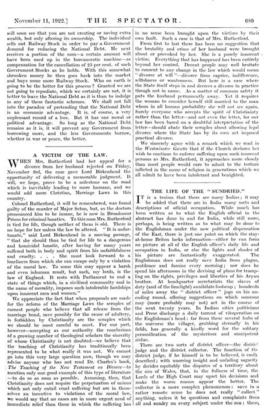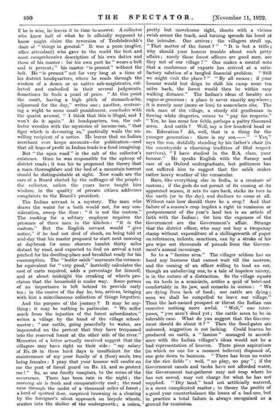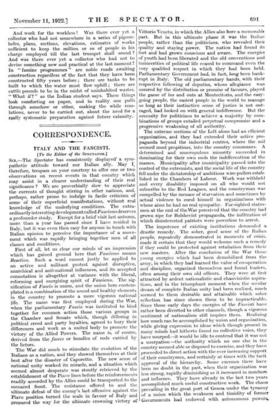THE LIFE OF THE " SUNDRIED."
IT is a truism that there are many Indias ; it may be added that there are in India many sorts and descriptions of official occupation. While much has been written as to what the English official in the abstract has done in and for India, while still more, perhaps, is being written as to what may be done to the Englishman under the new political dispensation of the East, there is just one point on which the stay- at-home Briton lacks information—either he can form no picture at all of the English officer's daily life and occupation in India, or else the lights and shades of his picture are fantastically exaggerated. The Englishman does not really save India from plague, pestilence and famine every morning ; nor does he spend his afternoons in the devising of plans for tramp- ling on the rights, privileges and liberties of his Aryan brother. At headquarter secretariats the slaves of duty (and of the limelight) annihilate foolscap ; hundreds of miles away the " district officer " jogs on his un- ending round, offering suggestions on which someone may (more probably may not) act in the course of the next twenty years. In Indian cities politicians and Press discharge a daily torrent of vituperation on the Englishman's head : far from these several hubs of the universe the villager, grubbing eternally in his fields, has generally a kindly word for the solitary personification of the mysterious and omnipotent sirkar.
There arc two sorts of district officer—the district judge and the district collector. The function of the district judge, if he himself is to be believed, is easily described ; with unerring insight and unfailing sagacity he decides equitably the disputes of a territory about the size of Wales, that, in the fullness of time, the Lords of the High Court may upset his decisions and make the worse reason appear the better. The collector is a more complex phenomenon : save in a rather remote sense he does not really " collect " anything, unless it be questions and complaints from all and sundry on every subject under the sun : these, If he is wise, he leaves it to time to answer. A collector who knew half of what he is officially supposed to know might claim the reversion of Teufelsdrockh's chair of " things in general." It was a peon (anglice, office attendant) who gave to the world the best and most comprehensive description of his own duties and those of his master : for his own part he " wears a belt and is present;" his master "is present" without the belt. He "is present" not for very long at a time at his district headquarters, where he reads through the wisdom of a dozen or so native sub-magistrates, col- lected and embodied in their several judgments. Sometimes he finds a pearl of price. " At this point the court, having a high pitch of stomach-ache, adjourned for the day," writes one ; another, sentenc- ing a wight to some small punishment, concludes with the quaint avowal, " I think that this is illegal, and I won't do it again." At headquarters, too, the col- lector wrestles with the mysteries of income-tax, " that tiger which is devouring us," poetically wails the un- willing recipient of a notice. He learns that no Indian merchant ever keeps accounts—for publication—and that all hope of profit in Indian trade is a fond imagining.
But " the open road " is the salt of the collector's existence. Once he was responsible for the upkeep of district roads ; it was his to propound the theory that a main thoroughfare and the bed of a mountain torrent should be distinguishable at sight. Now roads are the care of a Board elected by the suffrages of the people ; the collector, unless the years have taught him wisdom, in the quality of private citizen addresses complaints to the Board's president.
The Indian servant is a mystery. The man who draws the water for a bath would not, for any con- sideration, sweep the -floor : " it is not the custom." The cooking for a solitary employer requires the presence of three men in the kitchen : "it is the custom." But the English servant would " give notice," if he had not died of shock, on being told at mid-day that his master proposed to start next morning at daybreak for some obscure hamlet thirty miles distant by road, and expected to find on arrival a tent pitched for his dwelling-place and breakfast ready for his consumption. The " butler sahib" murmurs the vernacu- lar equivalent for " very good," hurriedly calculates the cost of carts required, adds a percentage for himself, and at about midnight the creaking of wheels pro- claims that the household is under way. Some person of no importance is left behind to provide early tea ; in the course of the day he, too, arrives, bringing with him a miscellaneous collection of things forgotten.
And the purpose of the journey ? It may be any- thing ; it may be nothing in particular. " We suffer much from the injustice of the forest subordinates," writes a village by the hand of the village school- master ; " our cattle, going peacefully to water, are impounded on the pretext that they have trespassed Into the reserved forest at the other side of the river." Memories of a letter actually received suggest that the villagers may have right on their side : " my salary of Rs. 20 in these hard days is insufficient for the maintenance of my poor family of 4 (four) souls, two being females : I pray that your honour will confer on me the post of forest guard on Rs. 15, and so protect me I " So, as one fondly imagines, to the scene of the occurrence. There has been rain in the night ; the morning air is fresh and comparatively cool ; the road runs through the midst of a thousand miles of forest ; a herd of spotted deer, surprised browsing in a clearing by the foreigner's silent approach on bicycle wheels, crashes into the shelter of the undergrowth ; a cobra, pretty but unwelcome sight, shoots with a vicious swish across the track, and turning spreads his hood al the intruder. One arrives ; the villagers stroll up. " That matter of the forest ? " " It is but a trifle ; why should, your honour trouble about such petty affairs ; surely these forest officers are good men, are they not of our village ? " One makes a mental note that a conference of experts has arrived at a satis- factory solution of a tangled financial problem. " Still we might visit the place ? " " By all means ; if your honour would but deign to shift his camp some ten miles back, the forest would then be within easy walking distance." The Indian's ideas of locality are vague or generous : a place is never exactly anywhere ; it is merely near (more or less) to somewhere else. The rich man of the village, a sturdy old gentleman in flowing white draperies, comes to " pay his respects." " Yes, he has some few fields, perhaps a paltry thousand acres. And cattle ? Well, say a few hundred head or so. Education ? Ah, well, that is a thing for the younger generation : there is my son— " " Yes," says the son, dutifully standing by his father's chair (in the countryside a charming tradition of filial respect survives), " I have studied in the B.A. class, your honour." He speaks English with the fluency and ease of an Oxford undergraduate, but politeness has not suffered him to suggest that the sahib makes rather heavy weather of the vernacular.
Rain, like everything else in India, is a creature of custom ; if the gods do not permit of its coming at its appointed season, it sets its ears back, sticks its toes in the earth (or in the sky), and declines to come at all. Without rain how should there be a crop ? And that failure of a season's crop implies a right to remission or postponement of the year's land tax is an article of faith with the Indian ; for him the expenses of the Government are the Government's affair. Strange that the district officer, who may not buy a twopenny stamp without expenditure of a shillingsworth of paper on references, indents, sanctions, can by a stroke of his- pen wipe out thousands of pounds from the Govern- ment's annual incomings.
So to a " famine area." The villager seldom has on hand any business that cannot wait till the morrow, and the coming of an officer willing to lend an ear, though an unbelieving one, to a tale of hopeless misery, is in the nature of a distraction. So the village squats on its heels in a semicircle, settles a quid of betel-nut comfortably in its jaw, and remarks in unison : " We are dying from lack of food ; our cattle are dying ; soon we shall be compelled to leave our village." Than the last-named prospect or threat the Indian can conceive nothing more awful. " Well," one inter- poses, " you aren't dead yet ; the cattle seem to be in. tolerable case. What do you suggest that the Govern- ment should do about it ? " Then the flood-gates are unloosed, suggestion is not lacking. Could heaven be produced on earth, a " famine " managed in accord- ance with the Indian villager's ideas would not be a bad representation of heaven. These pious aspirations (in which no one for a moment believes) disposed of, one gets down to business. " There has been no water for the rice fields " : well, " no play, no pay " ; if the Government canals and tanks have not afforded water, the Government tax-gatherer may not reap where he has not sowed, may not charge for what he has not supplied. " Dry land," land not artificially watered, is a more complicated matter ; in theory the profits of a good year counterbalance the losses of a bad one, but in practice a total failure is always recognized as a ground for remission. And work for the workless ! Was there ever yet a collector who had not somewhere in a series of pigeon- holes, plans, sections, elevations, estimates of works sufficient to keep the million or so of people in his charge employed till the last trumpet shall sound ? And was there ever yet a collector who had not to devise something new and practical at the last moment ? In " famine programmes " are noble roads awaiting construction regardless of the fact that they have been constructed fifty years before ; there are tanks to be built to which the water must flow uphill ; there are cattle pounds to be in the midst of uninhabited wastes. " What if ? " as the Indian student says. These things look comforting on paper, and in reality one pulls through somehow or other, making the while reso- lutions, never to be carried out, about the need for a really systematic preparation against future calamity.




























































 Previous page
Previous page